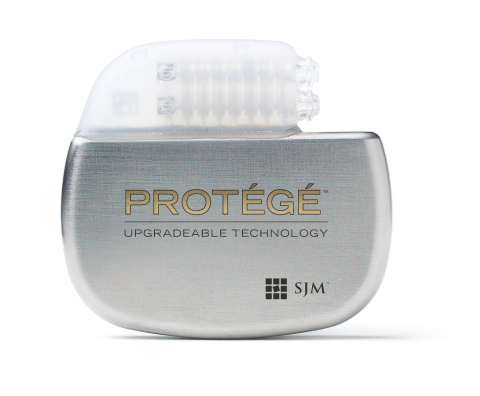TMCnet News
World's First and Only Upgradeable Spinal Cord Stimulation System Receives FDA ApprovalST. PAUL, Minn. --(Business Wire)-- St. Jude Medical, Inc. (NYSE:STJ), a global medical device company, today announced the approval of its Protégé™ IPG from the U.S. Food and Drug Administration (FDA). Protégé is the first and only neurostimulation system that allows spinal cord stimulation (SCS (News - Alert)) technology upgrades as they are approved to be made via software updates. Chronic pain sufferers implanted with this new device can access innovative therapies, stimulation modes, diagnostics or other features once approved through future software upgrades - without the need to surgically replace their medical device. 
The Protege (TM) upgradeable neurostimulator from St. Jude Medical, Inc. (Photo: St. Jude Medical) Chronic pain affects 100 million Americans, more than heart disease, cancer and diabetes combined. The debilitating disease is cause for 40 percent of work absences due to back pain, second only to the common cold (50 percent), and costs the nation more than $635 billion each year in medical treatment and lost productivity. SCS is a proven therapy that has been used to help manage chronic pain and improve patients' quality of life. "In the first 40 years of SCS we've seen advances in hardware but limited progress in software and programming. This new device evolves with promising therapies," said Dr. Timothy Deer, an interventional pain physician, president and CEO of the Center for Pain Relief in Charleston, W. Va., and president-elect of the International Neuromodulation Society, who was the first physician to implant a Protégé system. "With its upgradeability, SCS patients can readily access newly approved stimulation methods, allowing the latest technology to be synced with their medical device. This will reduce additional surgeries and lower the cost of care." Until now, one of the greatest challenges with neurostimulation has been giving patients access to the latest technologies without surgically replacing their medical device. Protégé changes the standard for SCS, allowing patients to access future innovations and therapies once approved without the cost and risks associated with surgical replacement. Protégé is the world's smallest neurostimulator to treat chronic pain of the trunk or limbs and pain from failed back surgery. It has an unmatched seven-year warranty and offers industry-leading 10-year projected battery life. It also has open-ended device longevity without an automatic shutoff. Protégé is built on a solid platform of success: Eighty-eight percent of patients report satisfaction at two years post-implant with a St. Jude Medical neurostimulator, saying their quality of life has been greatly improved.1 Spinal cord stimulation is an important therapy option for patients who have not been able to alleviate their chronic pain through traditional methods. Similar in function and appearance to a cardiac pacemaker, the Protégé neurostimulator delivers mild electrical pulses to the sinal cord, which interrupt or mask the pain signals' transmission to the brain. "Spinal cord stimulation therapy can transform the quality of life for patients who are otherwise unable to find relief from their chronic pain," said Eric S. Fain, M.D., group president of St. Jude Medical. "Protégé allows patients the opportunity to benefit from future therapies and features even after they receive their implanted system. This draws upon St. Jude Medical's promise to the quality and durability of its products and our commitment to continuously innovating in the neuromodulation space."
Spinal Cord Stimulation Research Through an Investigational Device Exemption (IDE) from the FDA, St. Jude Medical is evaluating whether a new waveform called burst stimulation can be more effective in managing chronic pain than traditional tonic stimulation. The purpose of the study, dubbed SUNBURST™ (Success Using Neuromodulation with BURST), is to evaluate the safety and efficacy of the Prodigy neurostimulator for the treatment of chronic intractable pain of the trunk and/or limbs. Prodigy is not approved for use in the U.S. The SENSE™ Subcutaneous and Epidural Neuromodulation System Evaluation study is designed to evaluate the combination of peripheral nerve field stimulation (PNfS) and SCS to determine whether the two therapies together offer more effective management of chronic low back and leg pain than SCS alone.
About Chronic Pain
About St. Jude Medical
Forward-Looking Statements 1. Mironer, E.; Berstein, C.A.; Masone, R.; Garcia. E.; Amayem, A.; Johans, T.; Ghodsi, A.; Leung, A.; Rosenberg, J.; Golovac, S. (INS 2011) "A Prospective Clinical Evaluation of a Rechargeable Implantable Pulse (News - Alert) Generator (IPG): Final analysis of the Sustainability of Spinal Cord Stimulation Therapy for Chronic Lower Back Pain
Photos/Multimedia Gallery Available: http://www.businesswire.com/multimedia/home/20140404005119/en/ |

